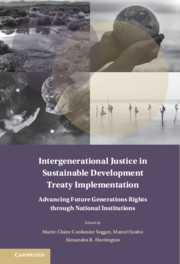 Intergenerational Justice in Sustainable Development Treaty Implementation
Intergenerational Justice in Sustainable Development Treaty Implementation Book contents
- Intergenerational Justice in Sustainable Development Treaty Implementation
- Treaty Implementation for Sustainable Development
- Intergenerational Justice in Sustainable Development Treaty Implementation
- Copyright page
- Contents
- Figures
- Tables
- Notes on Contributors
- Foreword
- Acknowledgements
- Abbreviations and Acronyms
- 1 Introduction
- 2 The Theoretical Framework for International Legal Principles of Intergenerational Equity and Implementation through National Institutions
- Part I Introduction to Treaty Law on Intergenerational Justice and Codifying Sustainability
- Part II Key Challenges in Domestic Implementation of Intergenerational Justice
- Part III Law and Policy Innovations for Intergenerational Justice
- Part IV Implementing Sustainability through National Institutions: Case Studies
- Part V Regional Trends in Intergenerational Justice
- Part VI Future Trends
- 36 Equity across Generations in Implementing International Law on Water
- 37 Intergenerational Justice in the Paris Agreement on Climate Change
- 38 The Four-Branches Model of Government: Representing Future Generations
- 39 Intergenerational Equity in Sustainable Development Treaty Implementation
- Afterword
- Table of Authorities
38 - The Four-Branches Model of Government: Representing Future Generations
from Part VI - Future Trends
Published online by Cambridge University Press: 15 October 2021
- Intergenerational Justice in Sustainable Development Treaty Implementation
- Treaty Implementation for Sustainable Development
- Intergenerational Justice in Sustainable Development Treaty Implementation
- Copyright page
- Contents
- Figures
- Tables
- Notes on Contributors
- Foreword
- Acknowledgements
- Abbreviations and Acronyms
- 1 Introduction
- 2 The Theoretical Framework for International Legal Principles of Intergenerational Equity and Implementation through National Institutions
- Part I Introduction to Treaty Law on Intergenerational Justice and Codifying Sustainability
- Part II Key Challenges in Domestic Implementation of Intergenerational Justice
- Part III Law and Policy Innovations for Intergenerational Justice
- Part IV Implementing Sustainability through National Institutions: Case Studies
- Part V Regional Trends in Intergenerational Justice
- Part VI Future Trends
- 36 Equity across Generations in Implementing International Law on Water
- 37 Intergenerational Justice in the Paris Agreement on Climate Change
- 38 The Four-Branches Model of Government: Representing Future Generations
- 39 Intergenerational Equity in Sustainable Development Treaty Implementation
- Afterword
- Table of Authorities
Summary
Only recently, in the past two decades, have scholars of philosophy, law, and political science engaged in a burgeoning debate about the ‘presentism’ of the democratic form of government. Since these studies are quite new, concept formation still remains unfinished. To be sure, having an adequate terminology is essential – after all, just as concepts without corresponding phenomena are empty, so too are existing phenomena inaccessible to human reason without appropriate concepts. For instance, the concepts of ‘presentism’ and ‘short-termism’ do not mean the same. ‘Presentism’ stands in sharp contrast to the noble idea of ‘intergenerational justice’, but the same is not necessarily true for the phrase ‘short term’. Take, for example, the political right of generations to self-determination. Constitution-making is a case in point that has been discussed regularly in political philosophy, and at great length in particular by Jefferson, Madison, and Paine during the founding of the US. Constitutions enshrine the fundamental values of a people and they build a framework for a state’s public policy. With regard to intergenerational justice, their long-term endurance gives rise to two concerns: the (forgone) welfare concern and the sovereignty concern. A procedure for constitution-amending that is intergenerationally just must not be too rigid and long-term-oriented. One must thus be careful with criticizing short-termism and praising long-termism in general. Not every short-term action is a form of myopia that overdiscounts the interests of future generations. Another remark regarding terminology: speaking of ‘institutions for the future’ is not wrong but a little imprecise. The future itself is no moral patient. It can neither be harmed nor benefited. If one seeks to address the members of future generations of the human species, one should say so. Terminologically, the use of specific concepts such as ‘institutions for future generations’ is preferable to concepts such as ‘future-beneficial institutions’ or ‘institutions for the future’. This chapter will critique the concept of ‘presentism’ (harmful short-termism) and discuss ‘institutions for future generations’ in general and ‘offices for future citizens of specific states’ in particular.
- Type
- Chapter
- Information
- Intergenerational Justice in Sustainable Development Treaty ImplementationAdvancing Future Generations Rights through National Institutions, pp. 754 - 780Publisher: Cambridge University PressPrint publication year: 2021
- 1
- Cited by


